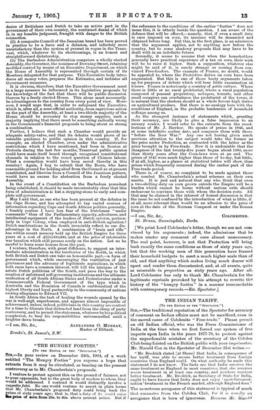[To THE EDITOR OP THE "SPECTATOR:]
Sin,—In your review on December 24tb, 1904, of a work entitled "The Hungry Forties" you express a hope that extracts from it may be circulated, as bearing on the present controversy as to Mr. Chamberlain's proposals.
I venture to protest against this on the ground of fairness, not t..% your opponents, but to the great body of readers to whom they would be addressed. I contend it would distinctly involve a suggestio falai. No one would venture to assert in plain terms that Mr. Chamberlain's proposed duty could bring back the trims of sixty years ago ; that is, that a duty of 23. could raise Ike price of so= from 25s. to 30s. above present prices. But if
the reference to the conditions of the earlier " forties " does not mean this, it is utterly beside the question. I am aware of the defence that will be offered,—namely, that if even a small duty is once imposed on corn, its increase will be demanded and obtained before long. But this, in the first place, is an admission that the argument applies, not to anything now before the country, but to some shadowy proposals that may have to be dealt with in an indefinite future.
Secondly, it seems to assume that when the householders generally have practical experience of a tax on corn, their wish will be to raise it higher. Such a supposition, whatever else might be said of it, is surely strange as coming from con- vinced Free-fooders. The example of France, no doubt, would be appealed to, where the Protective duties on corn have been augmented. But this is one of those hasty arguments taken up for purposes of debate which will bear little examination at leisure. France is notoriously a country of petite culture. Where there is little or no rural proletariat, where a rural population composed of peasant proprietory, metayers, tenants, and other small occupiers can overbalance the proletariat of the towns, it is natural that the electors should as a whole favour high duties on agricultural produce. But there is no analogy here with the conditions of England, in the probable tendencies of household suffrage among us.
As the strongest instance of statements which, granting their accuracy, are likely to give a false impression to an unwary reader, I would refer to the extracts from the recol- lections of Mr. J. Hawker. He speaks of prices in 1845, and at some indefinite earlier date, and compares them with those "before the Boer War." Any one not having given much previous attention to the subject would take the former as the price under Protection, as contrasted with the latter as the price brought in by Free-trade. Now it is undeniable that the cheapness of the last twenty-five years began about 1880, more than thirty years after the Corn-laws were at an end. The prices of 1845 were much higher than those of to-day, but little, if at all, higher, as a glance at statistical tables will show, than prices which frequently occurred during the earlier part of the Free-trade period.
There is, of course, no complaint to be made against those who combat Mr. Chamberlain's actual schemes on their own merits. It is just and natural that any who think that even a two-shilling duty on corn grown outside the Empire will be a burden which cannot be borne without serious evils should endeavour to convince those with whom the decision rests. All. that may be claimed in the interest of honest discussion is that the issue be not confused by the introduction of what is little, if at all, more relevant than would be an allusion to the price of corn at the date of the Norman Conquest or under the Boman Empire.
—I am, Sir, &c., COLCHESTER.
St. Bruno, Sunningdale, Berks.
[We print Lord Colchester's letter, though we are not cone vinced by his arguments ; indeed, the admissions that he makes render any comment of ours almost unnecessary. The real point, however, is not that Protection will bring back exactly the same conditions as those of sixty years ago, but that the working men of this generation have framed their household budgets to meet a much higher scale than of old, and that anything which makes living much dearer will upset and render them discontented, and, at all events, quite as miserable in proportion as sixty years ago. After all, Lord Colchester has only to thank Mr. Chamberlain for the legitimate reprisals provoked by his attempt to rewrite the history of the "hungry forties" in a manner irreconcilable with contemporary records.—ED. Spectator.]














































 Previous page
Previous page